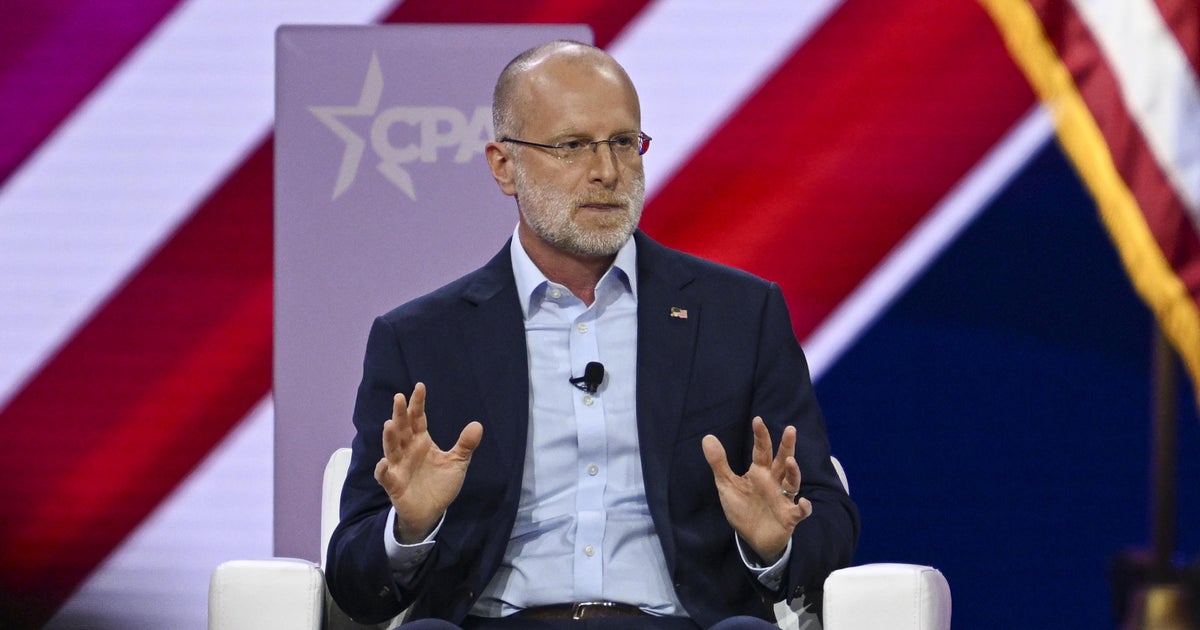President Trump considers the EU a trade "foe" -- is it?
President Trump stunned a global audience when he named the European Union as a leading trade "foe" in an interview with CBS News on Sunday. Here are some things to know about the EU-U.S. trade relationship:
Europe and the U.S. are each other's most important market
The two trading partners generate $5.5 trillion in total commercial annual sales, according to a recent report from the American Chamber of Commerce to the European Union and researchers at Johns Hopkins University. The relationship accounts for as many as 15 million workers in mutually "on-shored" jobs on both sides of the Atlantic, the report said.
"It is the largest and wealthiest market in the world, accounting for one-third of world GDP in terms of purchasing power and half of total global personal consumption," according to the report.
Ambassadors from the EU reinforced that notion in an opinion piece in the Washington Post last month that lauded the breadth and depth of the trade relationship. "The fact is, we are both winning and have been for years," the ambassadors from 29 EU nations wrote. "Claims to the contrary, including that the United States is at the losing end of this relationship, deserve to be debunked. Because the United States makes more money doing business with the EU."
U.S. goods and services direct trade with the EU totaled nearly $1.1 trillion in 2016, according to the U.S. Trade Representative. Exports totaled $501 billion that year, while imports totaled $592 billion. The U.S. goods and services trade deficit with the EU was $92 billion in 2016. The deficit for U.S. goods alone -- minus services -- was larger: $147 billion in that year, according to the USTR.
Trade deficits don't tell the full story on trade
Mr. Trump and his economic advisers focus on trade deficits, but most economists say the relationship is far more complicated -- and beneficial.
The U.S. economy is consumer-based, with households saving far less than their counterparts in Europe. The personal savings rate among Americans is about 3.2 percent, according to the St. Louis Fed. In Europe, it's more than 10 percent, according to Tradingeconomics.com and Eurostat.
So during economic boom times like now, consumers are more likely to spend more than they save, and that includes buying imported goods and services. When the economy slumps, consumers spend less, and trade deficits decline, like during the Great Recession a decade ago.
That also means tariffs aren't necessarily the best way to alter a relationship with another trading entity, most economists say. On the contrary, past free trade agreements have prompted European companies to set up manufacturing plants in the U.S., resulting in U.S. jobs.
Current tariffs on both sides of the Atlantic are traditionally low
The average weighted tariffs for U.S. exports to the EU in 2017 were 1.4 percent. Only Japan was lower at 0.6 percent, according to a recent note from Oxford Economics using World Trade Organization data and its own calculations.
Tariffs on exports into the U.S. from the EU (or U.S. imports from the EU) were 1.6 percent, above Canada at 1.3 percent and just below Japan at 1.8 percent.
Escalating trade tariffs could mean job losses for both sides
President Trump's proposed 20 percent tariff on EU auto imports, for instance, may cost 100,000 U.S. jobs in 2019 alone, economists at Oxford Economics estimated in a June 28 note.
Because the auto tariffs would inject "uncertainty" into a major piece of the U.S. economy, the "total shock" could be twice as large, the Oxford analysts wrote. It would also be felt quickly. Mostly luxury auto brands would be hit, such as Audi, BMW and Mercedes, "but higher import prices for parts could affect the pricing of mid-range vehicles produced in the U.S. like Volkswagen," the analysts wrote.
"What's not talked about," said Michelle Casario, an assistant professor of economics at Villanova University, "is that the major producers have factories in the U.S. -- BMW and Mercedes have massive factories in the U.S. that employ thousands of American workers."
German brands alone employ more than 36,500 U.S. workers, and they're mostly in the South. BMW's Spartanburg, South Carolina, plant produced more than 371,000 BMW X3, X4, X5 and X6 models in 2017 and employs some 10,000 people, according to the company.
"Many of these companies have plans to expand and hire more workers in high-paying jobs, and a trade war and retaliatory tariffs are going to hurt that relationship -- and end up costing jobs," Casario said. "So while we can look at the trade deficit as one measure of our relationship to Europe, it's so much bigger than that."
Trade tit-for-tats can spark unintended consequences
U.S. companies may also end up raising the prices of their goods that compete with the imports, economists like Casario point out. That happened when the Trump administration imposed tariffs on Korean washing machines earlier this year, the Wall Street Journal noted this week. U.S.-made Whirlpools would've benefitted, but subsequent U.S. tariffs on aluminum and steel and other countries' retaliatory tariffs on industrial parts soon sent the price of Whilrpools and other washing machines soaring nearly 20% within weeks.
Significant price hikes can lead to unintended consequences across both sides of the Atlantic. Harley-Davidson (HOG) is moving some production to Europe, at the cost of U.S. jobs, because of the EU's retaliatory tariffs for Mr. Trump's on steel and aluminum made it too expensive for the company to export them to Europe.
Swedish carmaker Volvo, which opened a factory in South Carolina earlier this year, expects to employ 2,000 people initially, eventually bringing the workforce up to 4,000, according to its website. "If you have trade barriers and restrictions, we cannot create as many jobs as we are planning to," Volvo Cars CEO Hakan Samuelsson told Reuters at an event celebrating the new facility last month.
Mr. Trump's trade policies may well crimp EU growth, meaning fewer customers in Europe for U.S. goods and services. In June, the International Monetary Fund cut its growth forecast for the EU to 2.2 percent this year, down 0.2 percentage points from its April outlook. The IMF also said trade frictions may imperil world growth as a whole, according to Bloomberg.
Quelle surprise: The EU just signed its own trade deal with Japan
The new Japan-EU trade agreement eliminates about 99 percent of the tariffs on Japanese goods sold to the EU. About 94 percent of the tariffs on European exports to Japan will be lifted, rising to 99 percent in the future. The difference reflects exceptions on such products as rice, which enjoys strong political protection from imports in Japan.
This agreement makes it more attractive for the trading partners to sell to each other, just as the U.S. is slapping restrictions on most of its own global trading partners. Combined, the EU and Japan make up for about a third of the global economy, touching more than 600 million people.
"The EU and Japan showed an undeterred determination to lead the world as flag-bearers for free trade," Japanese Prime Minister Shinzo Abe said at a joint news conference with European Council President Donald Tusk and European Commission President Jean-Claude Juncker. Tusk said the pair are "sending a clear message" against protectionism.
The EU is also looking beyond Japan. On Monday, Juncker and Tusk were hosted by Chinese Premier Li Keqiang, who emphasized upholding free trade and multilateralism, just as the Trump administration considers more tariffs and shows no signs of negotiation, Reuters reported.
The Associated Press contributed to this report.






